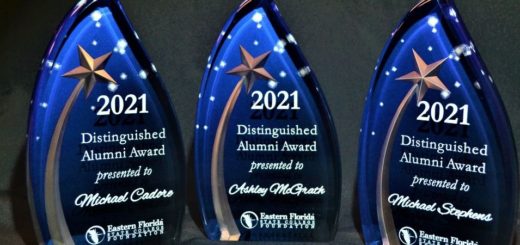Faces on Campus: Dr. Phil Simpson
UPDATE: As of July 1, 2021, Dr. Phil Simpson has taken on the new role of Dean of Arts and Social Sciences, Melbourne Campus Administrator, and Eastern Florida Online Administrator.
You just never know who you’ll meet at Eastern Florida State College. Dr. Phil Simpson — not to be confused with Dr. Phil on “The Simpsons” — is the Provost of our Titusville Campus and Eastern Florida Online, and so much more. He is a living example of someone who has taken his passion and incorporated it into his profession.
From the Beginning

I am always interested in hearing the “How did you get here?” stories of the people I meet, and Dr. Simpson’s is no exception. How did he become the Titusville Provost, a pop culture enthusiast, a true crime author and researcher, and more?
Some highlights from his resumé tells part of the story:
- Bachelor of Arts in English
- Master’s degree in English with a specialization in Creative Writing
- PhD in American and British Literature
- Completed a Holocaust Studies graduate course (with a humanities focus that fed his fascination with history and the arts in general)
- Full-time English professor on the Palm Bay Campus (1997)
- Department Chair after eight years (his first administrative job)
- Dean of Social Behavioral Sciences (2005)
- Associate Provost on the Palm Bay Campus
With an extensive academic background in English, creative writing, and literature, Dr. Simpson has a passion for pop culture and all things true crime-related. He’s EFSC’s unofficial resident expert on historical criminals like Charles Manson and Ted Bundy, as well as on the works of famous authors like Stephen King.
Dr. Simpson’s attraction to pop culture began while attending a conference as a grad student at the University of Michigan. One of his major influencers, Dr. Gary Hoppenstand, saw something in him and offered him an area chair position with the National Pop Culture Association (PCA), which allowed him to work with presenters and review materials submitted for presentation. Stunned to be offered that level of responsibility after only four years of involvement, Dr. Simpson later became the PCA president.
Mentors Make the Difference
When I asked Dr. Simpson to share some of his memorable experiences as a student, he mentioned that all sorts of teachers had guided and inspired him. He remembers that he was undecided on a career until he took a pedagogy course in grad school. The instructor, Dr. Lisa McClure, later became an important mentor from whom he learned how to be a teacher. After taking her class, he found that he could see himself as a teacher and from that point, never questioned his decision to become one.
The examples and experiences gained from mentors often shape who we become personally and professionally. Dr. McClure was one of many important mentors in Dr. Simpson’s life.
“I don’t think any of us can do what we do without mentors,” he said.
Naming all of the influencers in Dr. Simpson’s life would be a lengthy process, but he did mention specifically the Chief Learning Officers he has worked under here at EFSC: people like Dr. Don Astrap, Dr. Linda Miedema, and Dr. Randy Fletcher, who have been more than supervisors, and whose experiences he considers truly valuable.
When asked who the most influential person in his life is, Dr. Simpson’s was quick to mention his parents, who “put [him] on the road to becoming a teacher and writer, a lifelong learner, and to appreciating what it means to value education and give something back.”
Being a Servant-Leader
According to Dr. Simpson, the role of a campus provost is both challenging and rewarding. It’s a challenge to find the balance between “scheduling the classes students need to be successful, working with the faculty, and pathway development,” and it’s rewarding to live the life of a servant-leader.
One of Dr. Simpson’s most memorable experiences was when he had the opportunity to go to New Orleans with a group from EFSC’s Center for Service-Learning and Civic Engagement after Hurricane Katrina. He describes it as the “epitome of what service to the community looks like” and vividly remembers cleaning out the house of an older woman whose photo albums were tragically destroyed (and with them, the memories of a lifetime lost). He was grateful to have had the opportunity to help restore some sense of order and will never forget the important life lessons gleaned from that trip.
Do What You Love
At the end of the day, Dr. Simpson’s advice to college students is this:
“You may not initially have a clear understanding of where you want to go, but along the way, look for your calling and listen to your mentors. When you find it, do what you must to pursue it. Become a lifelong learner, and pass on what you know to help others.”
Never forget that mentors will see in you what you might not see in yourself — so go out there and do what you love!
- Faces on Campus: Winter Break Edition - December 15, 2021
- It’s Never Too Late - August 25, 2021
- Overcoming Barriers to Degree Completion - April 28, 2021







